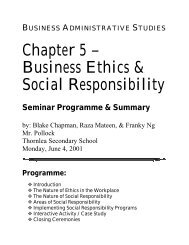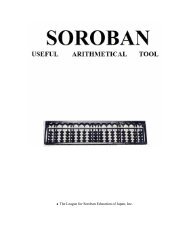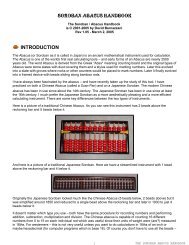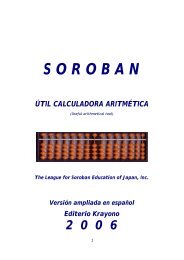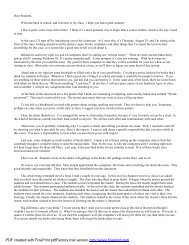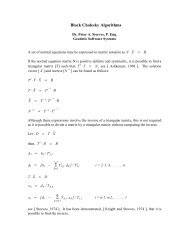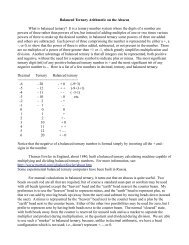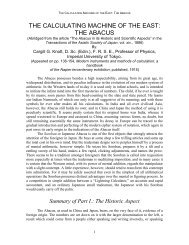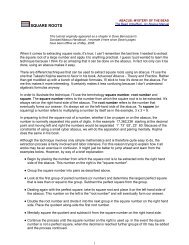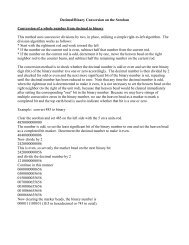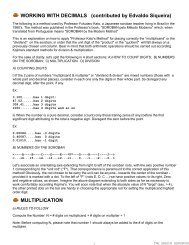Sexing Political Identities-Nationalism as Heterosexism.pdf
Sexing Political Identities-Nationalism as Heterosexism.pdf
Sexing Political Identities-Nationalism as Heterosexism.pdf
You also want an ePaper? Increase the reach of your titles
YUMPU automatically turns print PDFs into web optimized ePapers that Google loves.
concepts. Contemporary sexualities literature cautions against retrospectively<br />
reading, for example, ‘homosexuality’ into history, especially prior to modernist<br />
discourse on sexualities in these terms (e.g. Butler 1990; Halperin 1990). Hence,<br />
in this article my references to heterosexism and sex/gender identities in early<br />
state-making (below) should be read <strong>as</strong> focusing on the regulation of reproductive<br />
sexual activities that is a dominant feature of the state-making conjuncture (thus<br />
leaving <strong>as</strong>ide expressions of non-reproductive sexual activity). I would argue,<br />
however, that this regulation necessarily had effects on non-reproductive<br />
expressions of sexuality and is deeply implicated in the instantiation of sex/gender<br />
binaries more generally. In this article, I use homosexual and non-heterosexual<br />
(identities, practices, persons) <strong>as</strong> terms encomp<strong>as</strong>sing lesbian, gay, bisexual, and<br />
transgender (transvestite, transsexual) expressions of sexuality.<br />
The relationship between sexism (<strong>as</strong>sociated with feminist studies) and<br />
heterosexism (<strong>as</strong>sociated with queer studies) is complex and contested, not le<strong>as</strong>t<br />
because the meaning and relationships of key concepts are so contested. This is in<br />
part an unavoidable consequence of challenging the binary and essentialist terms<br />
that have traditionally demarcated spheres of activities and corollary studies of<br />
them. In brief, I intend this work <strong>as</strong> a contribution to both feminist and queer<br />
theories, which seek to deconstruct conventional binaries of sex, gender, and<br />
sexuality. Queer theorists quite rightly argue that ‘the study of sexuality is not<br />
coextensive with the study of gender’ (Sedgwick 1993: 27) and that acritical<br />
reliance on the latter – which characterizes some feminisms – fuels heterosexist<br />
bi<strong>as</strong> (Sedgwick 1993: 31). This article attempts to deconstruct gender <strong>as</strong> a binary<br />
that is symbolically and structurally inextricable from the heterosexism of<br />
states/nations and to argue, by implication, that feminist theory is not coextensive<br />
with but cannot be separate from, or indifferent to, queer theory. In this I follow<br />
Butler (1994) and Martin (1994) in arguing that critical analyses of sex and<br />
sexualities are inextricable and feminist and queer studies should avoid<br />
reproducing any dichotomization of their relationship. Rather, <strong>as</strong> Butler (1994: 15)<br />
suggests, it is conceptually more productive and politically more appropriate ‘for<br />
feminism to offer a critique of gender hierarchy that might be incorporated into a<br />
radical theory of sex {gay, lesbian, and queer studies}, and for radical sexual theory<br />
to challenge and enrich feminism.’ I return to these issues in the conclusion.<br />
10 My enduring interest in state-making springs from two convictions. First,<br />
although the state is a key category in IR, it remains poorly theorized, due to<br />
inadequate historical attention and disciplinary blinders. Hence, my own<br />
theorization of states draws on research in archeology, anthropology, cl<strong>as</strong>sical<br />
studies, western philosophy, political economy, state theories, and feminist<br />
scholarship (for elaboration and citations see Peterson 1988, 1992b, 1997). Second,<br />
with other critical postmodernists, I wish to move beyond arguments for postmodernist<br />
understanding (necessary in the face of obdurate modernist/m<strong>as</strong>culinist<br />
commitments) to postmodernist theorizing that more readily (though never simply<br />
or innocently) informs political practice. C<strong>as</strong>t <strong>as</strong> challenges to reigning approaches,<br />
the former tend to emph<strong>as</strong>ize the symbolic and cultural (signi cation, intersubjective<br />
meaning systems, language, discourse, representation, interpretation,<br />
58 International Feminist Journal of Politics




